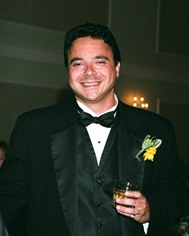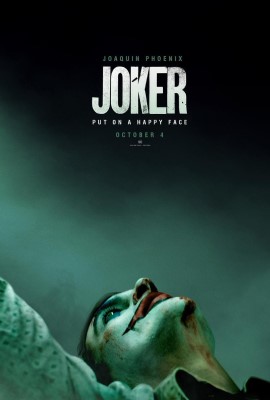Comic book fans may feel like the joke is on them watching “Joker” but what the movie lacks in substance, it makes up for in style.
As the origin story for Batman’s arch nemesis, “Joker” immediately takes you out of fantasy and into gritty reality with a character study of Arthur Fleck (Joaquin Phoenix).
Arthur is as man on the verge of a nervous breakdown, indicated by uncontrollable fits of laughter when he’s angry or upset. On a weekly visit to a social worker for medication after a stint in an institution, we learn he feels isolated from the world around him. Encouraged to keep a diary to help vent his feelings, Arthur uses the book instead to transcribe jokes. He dreams of social acceptance as a stand-up comic. One glance at the misspelled scribbles and centerfold cutouts in Arthur’s book tells us his stardom’s not secured.
To make ends meet until his comedic talent’s discovered, Arthur works as a clown-for-hire. The attention he craves wearing the costume soon makes him a target. After Arthur’s bullied and beaten by a passing group of punks, a co-worker gives him a gun for future protection. On a subway ride home, Arthur sees men harassing a woman on the train. The uncomfortable Arthur begins laughing uncontrollably. His laughter draws the attention of the men and they begin harassing Arthur instead. The incident escalates, Arthur’s gun goes off, and the birth of an iconic supervillain begins to take shape.
The weakness of “Joker” is its substance: a back story for Arthur Fleck that relies so heavily on two specific New York-based movies that it takes you out of feeling you’re in Gotham City. With a shirtless Arthur pouring over his diary seated at his kitchen table, you’re immediately reminded of Travis Bickle, Robert DeNiro’s character in “Taxi Driver.” After Arthur escapes the subway shooting with headlines proclaiming a ‘clown vigilante,’ you immediately think “Death Wish.” Even Robert DeNiro’s small part in “Joker” evokes New York: his local talk show host’s named Murray Franklin, an obvious reference to the late NYC talk show host Joe Franklin. Save for a small subplot involving Thomas Wayne (Batman’s dad) and his connection to Arthur, you’d almost forget you were in Gotham.
On the plus side, “Joker” has a distinct style. While director Todd Phillips (best known for “The Hangover” movies) makes the movie introspective and dark, Joaquin Phoenix makes the most of the mood. Given the unenviable task of playing a role made memorable by several actors, Phoenix plays it smart by playing it low-key. Even after we’ve seen Joker’s spectrum of past portrayals, from Cesar Romero’s giddiness to Heath Ledger’s sadism, Phoenix makes the beginning of Joker’s trademark characteristics his own. Watching Phoenix go through a gauntlet of emotions during one of Arthur’s laughing jags and we see a psyche about to snap. Ranging from the frustration at not being in control to hugging his body in pain at being unable to breathe, Phoenix conveys all of the mirth and madness we’ve come to expect from the Joker character. “Joker” may not be what you’d expect from a comic book movie but, by being different, it gets the last laugh.

